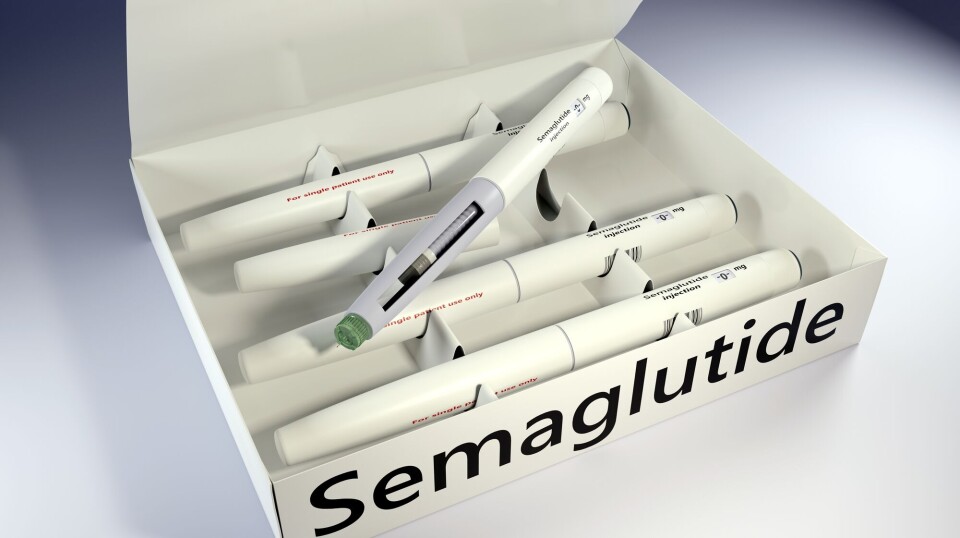
A new medicine for almost everything – is it too good to be true?
Alzheimer's, addiction, cardiovascular diseases, kidney disorders, sleep apnoea, diabetes, obesity, and overweight. Researchers are finding almost no limits to what the active substances semaglutide and tirzepatide can treat.
Initially, it was only about type 2 diabetes.
Semaglutide is the active substance in the Wegovy and Ozempic injections produced by the Danish pharmaceutical company Novo Nordisk.
Semaglutide works on diabetes by mimicking a natural hormone in the body called GLP-1. This hormone plays a key role in regulating blood sugar levels in the body.
The medicine Ozempic has proven to be very useful for people with type 2 diabetes.
But doctors also noticed a completely different effect when diabetic patients were prescribed semaglutide.
Many patients reported an interesting side effect: They lost a lot of weight.
Their weight loss was not solely due to better blood sugar regulatio. Patients simply felt fuller and had less appetite.
Studies eventually confirmed that what the patients reported was largely accurate.

Addiction, Alzheimer's, kidney disease, snoring...
Reducing obesity or overweight results in several positive health benefits for patients: from increased mobility and less joint pain to better mental health and lower risk of certain types of cancer.
But the drugs that mimic the natural GLP-1 hormone may be capable of even more. New studies have so far shown promising results for conditions such as:
- Heart attacks and stroke
- Kidney disease
- Addiction
- Sleep apnoea
- Alzheimer's
Could it be true?
Is it really possible that a medication initially designed for diabetes could significantly reduce the prevalence of so many widespread conditions?
Geir Selbæk, research director at the Norwegian National Centre for Ageing and Health, is a frequent source for Norwegian media on Alzheimer's and dementia.
He admits he has thought about sharing the recent progress in Alzheimer’s research with the media but has chosen to hold back for now.

“There's a lot of hype around GLP-1 drugs right now, and during such periods, indications often emerge that later fail to hold up,” he notes.
But Selbæk emphasises that these are solid studies with very interesting findings.
“The connection to a reduced risk of dementia or Alzheimer's is relatively strong, and there are plausible mechanisms to explain such a link," he says.
Believes weight loss is the most important factor
Jøran Hjelmesæth, section chief at Vestfold Hospital Trust's Department of hormones, obesity, and nutrition and professor at the University of Oslo, is closely following this research. But he is not entirely convinced.
“Studies can't yet provide clear evidence that these medications have a specific effect beyond the weight loss they induce in patients. Until I see strong studies that suggest otherwise, I believe weight loss is the most important factor. Weight loss impacts cardiovascular conditions and sleep apnoea,” says Hjelmesæth.
Selbæk also acknowledges that it is too early to draw conclusions.
“So far, we only have results from observational studies of people with diabetes. To recommend using these drugs for Alzheimer's patients, we need more studies showing the same results. Ideally, these studies should include groups without diabetes,” he says.
Less dementia and reduced brain volume loss
Nevertheless, several studies have captured the interest of dementia researchers.
Geir Selbæk highlights a recent Swedish study published in The Lancet. It examined 88,000 individuals over the age of 65 with type 2 diabetes.
The participants were treated with three different types of diabetes medications.

Researchers in Sweden found that individuals who received GLP-1 medications had a lower risk of developing dementia compared to those who received the other two diabetes medications.
The risk was reduced by 32 per cent and 23 per cent, respectively.
From these results, the researchers concluded that GLP-1 medications appear to reduce the risk of dementia in older adults.
Another study conducted at Imperial College London found that patients with mild Alzheimer's who took a GLP-1 medication for one year experienced almost 50 per cent less brain volume reduction in areas crucial for memory, learning, language, and decision-making, compared to those who received a placebo. Reduced brain volume is common in Alzheimer's.
100 patients in a Norwegian study
Per Selnes, a senior physician at Akershus University Hospital, is leading a Norwegian study involving about 100 participants in the early stagse of Alzheimer's disease who are receiving semaglutide in tablet form.
The study, called EVOKE, has approximately 3,000 participants internationally and is funded by Novo Nordisk.
“We know that significantly less dementia has been observed among patients who have taken GLP-1 medications. We're not entirely sure why these medications would work, but there are several theories,” Selnes tells sciencenorway.no.
“Animal experiments have shown that the medicine slows down the build-up of proteins in the cerebral cortex. These plaques are the fundamental changes associated with Alzheimer's disease. The medication has also led to improved memory and less inflammation in both the nervous system and body in animal experiments. Some smaller studies on humans have also suggested similar effects,” he says.
Diabetes of the brain?
Selnes also mentions another theory.
This theory suggests that Alzheimer's might be a type of diabetes of the brain.

“Some researchers now refer to Alzheimer's as ‘type 3 diabetes.’ This theory suggests there may be a possible connection between insulin resistance in the brain and the development of Alzheimer's,” explains Selnes.
“Perhaps we’ll find that it's a combination of these effects that slows the progression of Alzheimer's disease,” he says.
Selnes highlights that GLP-1 medications have been widely used and are considered to be relatively safe.
"There are very good reasons to test this out," he says.
Are we talking about inflammation in the body?
Should all these findings, or at least significant parts of the preliminary results, turn out to be true – then the big question becomes:
What is it about these new medications that creates such beneficial effects?
One possible factor related to Alzheimer's and perhaps also other conditions, as both Selbæk and Selnes point out, is inflammation in the body.
Inflammation is part of the body's natural immune response to injury or infection.

However, chronic inflammation damages tissue in the body. Inflammation is a known driver behind diseases such as cancer, cardiovascular diseases, and autoimmune disorders.
Perhaps these medications activate fundamental protective mechanisms within cells – mechanisms that reduce inflammation and remove waste products.
Researchers know that our intestines are often exposed to infections after a meal, and GLP-1 medications are already known to help reduce such inflammation.
GLP-1 is a hormone – a chemical messenger that sends signals throughout the body. It is normal for this hormone to be released after you have eaten. Once it enters the bloodstream, it helps regulate glucose levels and also makes you feel full.
Is weight loss really the key?
“The hypothesis that GLP-1 drugs have effects beyond weight loss is, of course, intriguing,” says Jøran Hjelmesæth.
Hjelmesæth recently co-authored a study examining the effects of weight loss medications on knee pain from osteoarthritis. The results showed a clear and significant effect. However, the effect could not be separated from the impact of the patients’ weight loss, he explains.

“To properly test this and draw definitive conclusions, we need to design studies where two groups of participants lose the same amount of weight – one group using weight lossmedications and the other without medical assistance. But no such study has been conducted yet,” he says.
Likely effect on addiction
Hjelmesæth finds it plausible that GLP-1 medications could also have an independent effect on addiction to alcohol and potentially other substances.
“We know that a substance like semaglutide not only increases the feeling of fullness from food but also suppresses the brain's reward mechanisms related to enjoyable food and drink,” he says.
“This makes it likely that semaglutide could also dampen the reward response in the brain’s pleasure centers to alcohol and possibly other substances. But here too, we lack the robust studies needed before drawing any definitive concludions,” says Hjelmesæth.
What about the side effects – for people and the economy?
Reported side effects of GLP-1 drugs include nausea, diarrhoea, vomiting, and constipation. Side effects vary in frequency and severity.
So far, most reported side effects are mild, with severe side effects being rare.
The societal and economic impacts, however, could be significant.
Two criticisms often raised about GLP-1 medications are their high cost and the potential need for lifelong use.
At least the first concern may prove temporary.
Cheaper versions of these expensive drugs are slowly becoming available. In India, a large pharmaceutical industry is preparing for the patents to expire soon, and many pharmaceutical manufacturers in China are also ready to produce alternatives.
Additionally, dozens of new GLP-1 drugs and similar medications are currently undergoing clinical trials. According to The Economist, here are as many as 300 variants in development.
For consumers, this likely means better and cheaper medications in the future. For healthcare systems worldwide, the question will be whether the cost of these medications is justified by the savings from a healthier population.

Less food sales, more cosmetics sales
At the same time, the companies behind these GLP-1 medications are earning enormous profits.

The companies Novo Nordisk and Eli Lily now have a combined market value exceeding 1.2 trillion USD, thanks for their GLP-1 medications. Novo Nordisk alone is worth five times as much as Equinor, Norway's most valuable company.
But not everyone is celebrating: Parts of the global food industry are following the development with alarm, reports The Economist.
Especially those parts of the food industry that sell unhealthy and calorie-dense products high in sugar and fat may feel the impact.
A survey by the American financial firm Morgan Stanley found that patients reduced their calorie intake by 20 to 30 per cent after using weight loss drugs.
Other analysts predict increased demand for sports equipment and especially beauty products, as people experience significant weight loss and potentially improved overall health.
If the average airline passenger in the USA were to lose 4.5 kilos, United Airlines alone could potentially save up to 80 million USD annually in fuel costs.
All because of lighter passengers.
———
Translated by Ingrid P. Nuse
Read the Norwegian version of this article on forskning.no
Sources and references:
Deanfield et al. Semaglutide and cardiovascular outcomes in patients with obesity and prevalent heart failure: a prespecified analysis of the SELECT trial, The Lancet, vol. 404, 2024.
Malhotra et al. Tirzepatide for the Treatment of Obstructive Sleep Apnea and Obesity, New England Journal of Medicine, vol. 391, 2024. DOI: 10.1056/NEJMoa2404881
Perkovic et al. Effects of Semaglutide on Chronic Kidney Disease in Patients with Type 2 Diabetes, New England Journal of Medicine, vol. 391, 2024. DOI: 10.1056/NEJMoa2403347
Qeadan et al. The association between glucose-dependent insulinotropic polypeptide and/or glucagon-like peptide-1 receptor agonist prescriptions and substance-related outcomes in patients with opioid and alcohol use disorders: A real-world data analysis, Addiction, 2024. DOI: 10.1111/add.16679
Quddos et al. Semaglutide and Tirzepatide reduce alcohol consumption in individuals with obesity, Scientific Reports, vol. 13, 2023. DOI: 10.1038/s41598-023-48267-2
The Economist: Competition will make weight-loss drugs better, cheaper and bigger, 2024.
The Economist: GLP-1s like Ozempic are among the most important drug breakthroughs ever, 2024.
UCL News: 'Weight loss’ drug semaglutide linked to better heart health, 2024.
Wang et al. Associations of semaglutide with first-time diagnosis of Alzheimer's disease in patients with type 2 diabetes: Target trial emulation using nationwide real-world data in the US, Alzheimer's & Dementia, 2024. DOI: 10.1002/alz.14313
Wang et al. Associations of semaglutide with incidence and recurrence of alcohol use disorder in real-world population, Nature Communications, vol. 15, 2024. DOI: 10.1038/s41467-024-48780-6
Related content:

Subscribe to our newsletter
The latest news from Science Norway, sent twice a week and completely free.






































